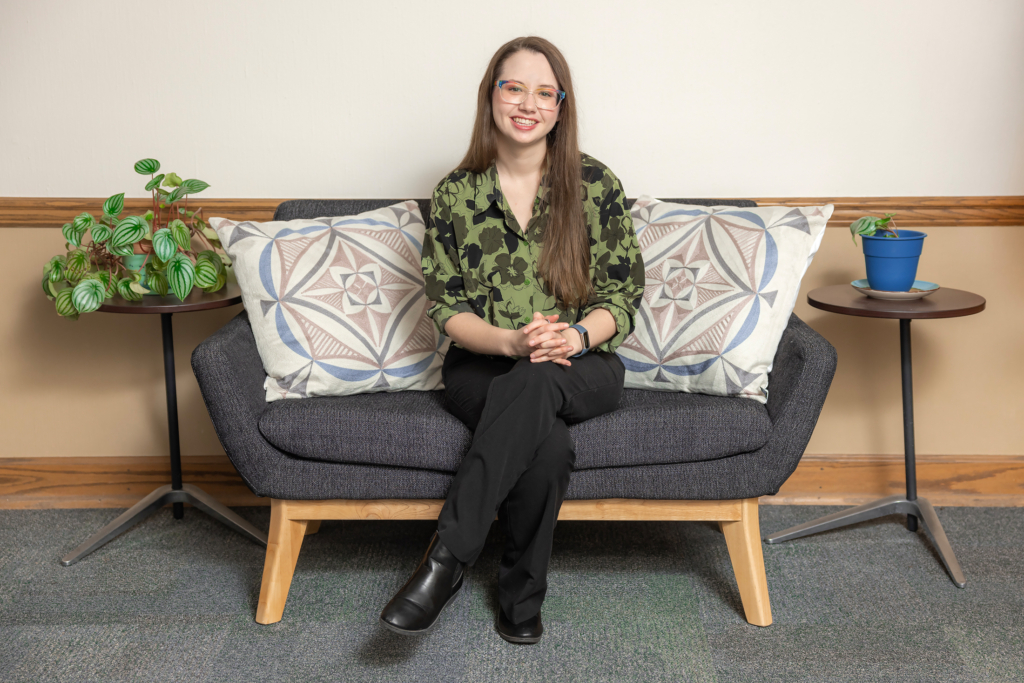When Rachel Watson received a Citizen Potawatomi Nation scholarship to help cover the cost of their master’s degree, they had no idea that just a few years later, they would head the Nation’s Department of Education.

Watson, a member of the Navarre family, was named director of the CPN Department of Education at the beginning of 2024, following the departure of the previous director, Tesia Zientek, in April of 2023.
“She’s a wonderful person and set a great example for how to deal with different situations. She set the standard for keeping things smooth and amicable,” Watson said of working with Zientek.
Watson attended Oklahoma City Public Schools, then completed an undergraduate degree at the University of Central Oklahoma in Edmond, Oklahoma, where they majored in history and minored in German. At the University of Pennsylvania, Watson received a CPN scholarship to help cover some of the costs as they earned a master’s degree in Education, Culture and Society.
“It’s basically an anthropology in education program, looking at the ways schools and society shape each other and that reciprocal relationship,” they said. “You can really make your degree program focus on what you want to learn, so I focused on diversity and equity in education, took some Indigenous language revitalization courses, that sort of thing.”
Watson has been with CPN for about three years, first working as a college advisor, then as a senior college advisor, then as senior student success advisor.
“Halfway through being a senior college advisor, we decided college advisor didn’t really capture what we wanted our advisors to be doing,” they said. “It was too specific to higher education when we have a broader focus.”
Though Watson hoped to someday head the department, they didn’t expect it to happen, and especially not so soon.
“I do think I have a unique perspective being part of the served population. I’m here to serve not just Citizen Potawatomi students but my family.”
“I wanted it, but I knew that there were a lot of different layers and a lot of different reasons why it would probably be unlikely,” they said. “For instance, Tesia was with the Tribe for a very long time, so I did not think she would leave, and especially not within my first two years of employment.”
Once the position did open up, however, Watson made a case to leadership that it was something they were interested in. And, though they do not think only Tribal members would be able to do the job, they do believe it’s an asset to have a Tribal member in the role.
“I do think I have a unique perspective being part of the served population. I’m here to serve not just Citizen Potawatomi students but my family. It’s my little sister, who is in sixth grade now, that I’m thinking about. When she’s ready for college, what kind of programming will there be? Or before she’s ready for college, how can I get her more connected to the Tribe?” Watson said.
Watson said they keep thinking back to a time when their family visited Shawnee. After describing some of the programs available, Watson’s sister asked, “If you didn’t work for the Tribe, how would we know that these things were going on?”
Watson thinks of that often and wants to strive to reach more Tribal citizens.
“If you want to be engaged and informed, you do have to be really active about seeking the Tribe out on social media or asking for the Hownikan to be sent to you every month,” they said. “I appreciate the citizens that are engaged and involved that way, but we have so many who just don’t feel comfortable or don’t know that they need to do that, even, and that’s kind of who I’m thinking about.”
Going forward, they would like to try to capture more Tribal members through means such as mailers — since that can sometimes be more reliable than social media or email.
As a scholarship recipient themself, Watson recognizes the importance of letting others know the opportunities that exist through CPN.
“It’s about the future of the Potawatomi Nation. That’s what we fund through our scholarships — our future leaders and our future employees,” they said.
And while the Tribe has programs such as the Potawatomi Leadership Program and Mdamen to help connect Tribal members to their heritage, Watson said those still have a limited audience.
“They’re wonderful programs, but you can only have 10 students in Sharp House, or 12 if you really pack them in. We have 30 in Mdamen, and that’s fantastic. But we have 39,000 Tribal citizens, and only 10,000 of them are located in Oklahoma,” Watson said. “So we want to come up with more ways to get folks involved.”
Watson said they, also, went through a period where they felt culturally disconnected from the Tribe, or like they weren’t Native enough, and they would like to help reach out to other students going through the same thing.
“We know our students don’t tend to check the Native American box when filling out enrollment forms, so we want to let them know that their Tribe does claim them, that it’s an important part of their identity, and that they’re an important part of the Tribe,” they said.
Watson anticipates continuing to collaborate with other CPN departments, such as Workforce & Social Services, the Child Development Center, Health Services and the Cultural Heritage Center, to help meet those goals.
For now, Watson also wants to focus on developing employees in the department to see where their focuses and interests lie, and using that information to craft a larger, strategic plan.
For more information about the CPN Department of Education, visit cpn.news/education.
